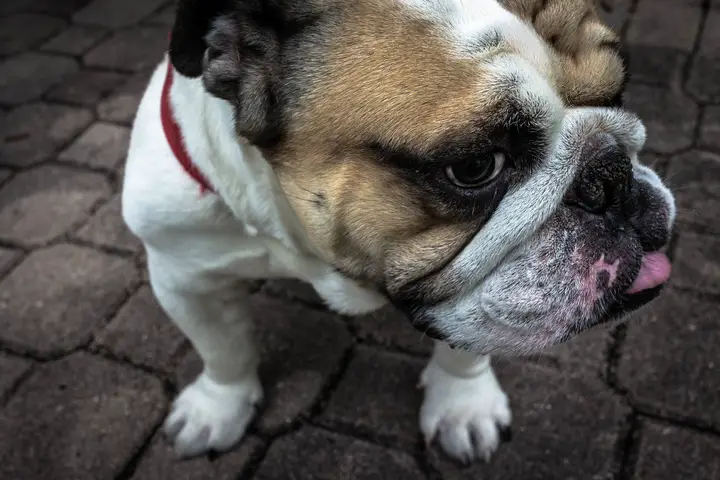Is your English Bulldog throwing up white foam? This can be due to various conditions, including heatstroke, acid reflux, bloat, toxin exposure, indigestion, and more. It’s very important to address this problem because a foaming mouth can also be an indication of rabies among unvaccinated Bulldogs.
But before we jump to conclusions, it’s critical to understand why your dog vomits white foam. Below, I discussed the possible reasons and what you can do in such cases.
Why is my English Bulldog throwing up white foam?
Dogs can emit various substances through their mouths. It also varies in color, but if your Bulldog is frothing white foam, the following are the potential causes you should rule out:
1. Heatstroke

As a brachycephalic breed, English Bulldogs are at high risk of experience heatstroke. This occurs when the dog is exposed to high temperatures for long periods.
Heatstroke will lead to shortness of breath, overheating, disorientation, and foaming of the mouth. It will start as excessive salivation until you notice that your Bulldog has white foam forming on its lips.
Aside from white foam, heatstroke is also accompanied by the following symptoms:
- Vomiting
- Diarrhea
- Bright red tongue and gums
- Sticky gums
- Sluggishness
- Excessive panting
- Collapse
Remember that heatstroke is very dangerous for all dogs, not just English Bulldogs. Once you notice these symptoms, you should perform steps to cool down your pet.
Give your dog a small amount of cool water. Don’t give a whole bowl as your dog will likely gobble it down, which can lead to bloat.
Also, if you’re near a body of water, say a lake or river, let your Bulldog take a dip in a shaded area. It will also help to place a wet cloth on your Bulldog’s armpits, neck, and hind legs. This will help cool down your dog to stop the formation of white foam on its mouth.
2. Pancreatitis
Canine pancreatitis occurs when the pancreas becomes inflamed. This is the organ that sits on the right side of the dog’s abdomen, right next to the stomach. It’s responsible for producing various enzymes that regulate digestion and multiple hormonal functions.
An English Bulldog with pancreatitis will often throw up white foam. They will also vomit their food due to digestive problems.
Aside from that, canine pancreatitis is characterized by the following symptoms:
- Loss of appetite
- Diarrhea
- Hunched back
- Stomach pain
- Weight loss
Pancreatitis can become a life-threatening condition if not treated right away. It’s important to bring your dog to the vet for proper diagnosis and treatment.
Most of the time, the vet will perform physical tests and blood work to ensure that your dog indeed has pancreatitis.
Another concerning fact here is that pancreatitis often occurs on canines with kidney disease. It’s observed mainly on dogs undergoing peritoneal dialysis.
3. Indigestion

Gastrointestinal distress due to indigestion is one of the leading reasons why dogs throw up white foam. This isn’t surprising since English Bulldogs are quite notorious for GI problems due to their deep chest and a slew of sensitivities.
For my English Bulldogs, throwing up white foam is often due to dietary indiscretion. It means they keep eating non-food stuff, which causes tummy problems. From grass, carpet fibers, paper, squeaker toys – name it, my dogs have tried to eat it.
Most of these problems will resolve on their own once your dog passed the foreign object. However, if your Bulldog is throwing up white foam, it’s a sign that you need to take the canine to the vet.
The non-food item probably blocked their throat or stomach, which causes the mouth to overproduce saliva. The white foam then eventually forms.
Aside from non-food items, allergies and intolerances can also result in throwing up white foam.
4. Bloat
Bloat is a simple problem that can turn deadly in a matter of hours. Deep-chested breeds like English Bulldogs are at high risk here, but almost every dog can experience it.
When the dog’s stomach becomes full with a combination of water, air, and food, it becomes distended. This is fairly common among dogs and will not always progress into a bigger problem.
However, if your English Bulldog’s stomach twists due to excessive bloating, the condition is called gastric dilatation or gastric torsion. As the stomach twists, the entry and exit points are blocked. There’s no way for your Bulldog to vomit or excrete the excessive stomach contents.
The following are some of the tell-tale signs of gastric dilatation among dogs:
- Swollen or distended abdomen
- White foam on the mouth
- Drooling
- Retching or attempting to vomit without releasing anything
- Arched back
- Rapid breathing
- Restlessness
- Gum paleness
Bulldogs suffering from gastric torsion requires immediate veterinary care. The vet will have to drain the contents of the stomach by surgery or the use of a tube.
Most cases of gastric torsion can’t be self-medicated at home. Remember that this condition gets more life-threatening by the hour.
5. Poisoning

Exposure to toxic substances can also cause an English Bulldog to throw up white foam. The toxins will cause gastrointestinal irritation, which triggers the dog to salivate intensely. It will also progress into vomiting white foam.
English Bulldogs have a ravenous appetite, so they will try to eat just about anything when they are famished. This includes the pesticide-treated grass on your lawn or poison-laced rodent baits.
Aside from actual toxic items, you should also watch out where you stash your pharmaceuticals. While OTC medications are helpful for humans, they can cause poisoning among dogs. Even paracetamol tablets can trigger white foam vomiting among Bulldogs.
For those who are keeping ornamental plants, they must know what’s poisonous and not. The likes of Aloe vera, daffodil, ivy, gladiola, and amaryllis are all common in home gardens but also poisonous to dogs.
If you plan to grow any of these plants, make sure that your Bulldog doesn’t have access to them.
Another thing you should avoid is giving table scraps and human food to your Bulldog. Sure, most of them are safe, but some can cause intense salivation and mouth foaming. Spicy food items and those containing too much salt can trigger irritations and vomiting in dogs.
6. Acid reflux
Acid reflux can also happen to dogs, which is quite similar to what humans experience. When this happens, your dog’s gastric fluids flow upward into the esophagus. This can lead to salivation and vomiting of white foam.
While this can happen to all dogs, acid reflux is more common in brachycephalic breeds like English Bulldogs. This breed has a shorter esophagus compared to non-brachycephalic canine.
The following are some of the common symptoms of canine acid reflux:
- Vomiting bile, with or without white foam
- Weight loss
- Poor appetite
- Discomfort
- Licking the air or lips excessively
- Vomiting of food
- Difficulty swallowing
Take note that recurring acid reflux among dogs can be a sign of a bigger, underlying problem. It’s best to bring your dog to the vet’s clinic for proper examination.
7. Parvovirus

Parvovirus is a very dangerous and deadly virus among dogs. Still, it’s very preventable with proper vaccination.
But if your English Bulldog got infected before its scheduled shots, you have to act fast. Puppies between 6 weeks and 6 months of age are at high risk.
When a dog contracts parvovirus, it will cause severe gastrointestinal upset. The following are some of its hallmark symptoms:
- Bloody and severe diarrhea
- Vomiting
- Mouth foaming
- Poor appetite
- Dehydration
- Depression
- Weakness and disorientation
Parvovirus will also reduce your dog’s ability to fight the virus because it decreases the white blood cell count.
Without treatment, a puppy English Bulldog can die in a matter of days or weeks. It’s important to seek immediate veterinary care for your dog once you noticed any of these symptoms.
In most cases, affected English Bulldogs would have to be hospitalized and isolated from other pets. This is to prevent the spread of contagious illness.
8. Kennel cough
Kennel cough is another contagious illness that can cause dogs to vomit white foam. A hacking cough is the major sign of this health problem, which will sound hoarse and dry.
It’s due to Bordetella bronchiseptica m bacterium, which can be prevented with on-time vaccination. However, it can also be triggered by a viral infection.
Aside from that, your English Bulldog with this condition will appear as if it’s gagging. Increased mucus production will also take place.
Kennel cough is called as such because it spreads quickly on animal shelters where pets are contained inside kennels.
For that matter, English Bulldogs, or any dog, can contract kennel cough by inhaling the bacteria or virus. Cold temperatures, poor ventilation, allergens, and stress also increase a dog’s susceptibility to this condition.
The good news is that kennel cough can be prevented by a Bordatella vaccine, which can be given to Bulldogs between 6 and 8 weeks of life. A booster shot is also needed four weeks after the first dose.
9. Rabies

Rabies is also known to cause mouth-foaming among dogs. However, this only happens when a dog isn’t vaccinated.
English Bulldogs infected with rabies will drool and foam on their mouth excessively. It’s also accompanied by the following symptoms:
- Seizures
- Aggression
- Staggering
- Loss of balance
- Difficult swallowing
- Incoordination
Take note that there’s no way to treat rabies in dogs. The only option you have is to put down the dog to stop the spread of the virus. It’s also for the safety of the people around since rabies is equally deadly for humans.
Another challenge here is that rabies can be tricky to diagnose. It can’t be diagnosed by blood work alone. The vet would have to conduct a biopsy of the brain tissue. Unfortunately, this can only be done once the animal is dead.
Like parvovirus and kennel cough, rabies can be prevented. English Bulldogs can have their first anti-rabies shot at 3 months old. A booster shot can be given at 9 months, followed by annual revaccination from then on.
Remember that rabies shots are core vaccines, which means they will be given to any dog, regardless of risk factors.
Frequently Asked Questions
Q: What should I do if my Bulldog throws up white foam?
A: The first thing you should do is call the vet. This way, you’ll receive proper guidance about what to do next. If your Bulldog keeps on vomiting, it’s best to bring it to the vet clinic right away.
Q: Is it normal for English Bulldogs to throw up?
A: English Bulldogs are prone to vomiting, especially if they aren’t fed for long periods. The vomit would have a yellowish bile color due to acid buildup that irritated the stomach. Still, this isn’t normal, and you should get your dog examined if it happens all the time.
Q: Why dogs vomit yellow foam?
A: Anything yellowish or greenish that your dog vomits contain bile. This substance is produced on the liver and plays an important role in digestion. However, it can be overproduced, which can lead to foamy vomiting.
Q: Can I give my English Bulldog Pepto Bismol?
A: Pepto Bismol is a human medication for upset stomach and can be given to dogs in small amounts. The rule of thumb is to use only one teaspoon for every 10 lbs. of your dog’s weight. Still, it’s best to call the vet to ensure that it’s safe to use on your dog, especially if it has a lingering illness or taking specific medications.
Q: Why does my Bulldog keep throwing up?
A: If your dog keeps throwing up, you should assess what happened before the vomiting occurs. If your Bulldog is eating before throwing up, acid reflux or eating too fast might be the reasons why. However, if the vomiting isn’t abating, you must seek immediate veterinary care.
Final words
Why is my English Bulldog throwing up white foam? It can be a case of heatstroke, pancreatitis, bloating, or poisoning. You should also rule out acid reflux and contagious diseases.
No matter what your Bulldog’s condition is, the veterinarian is always the best person to call. Never self-medicate your dog because it might do more harm than help.

